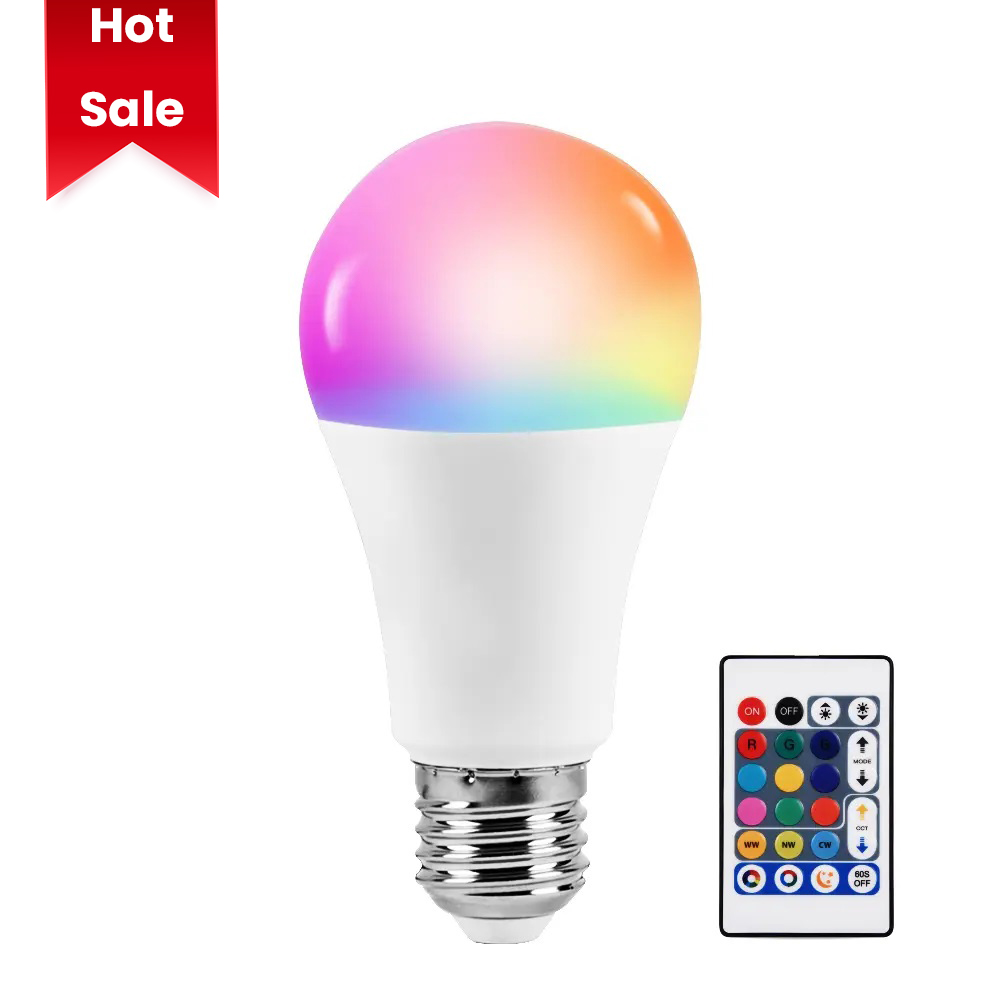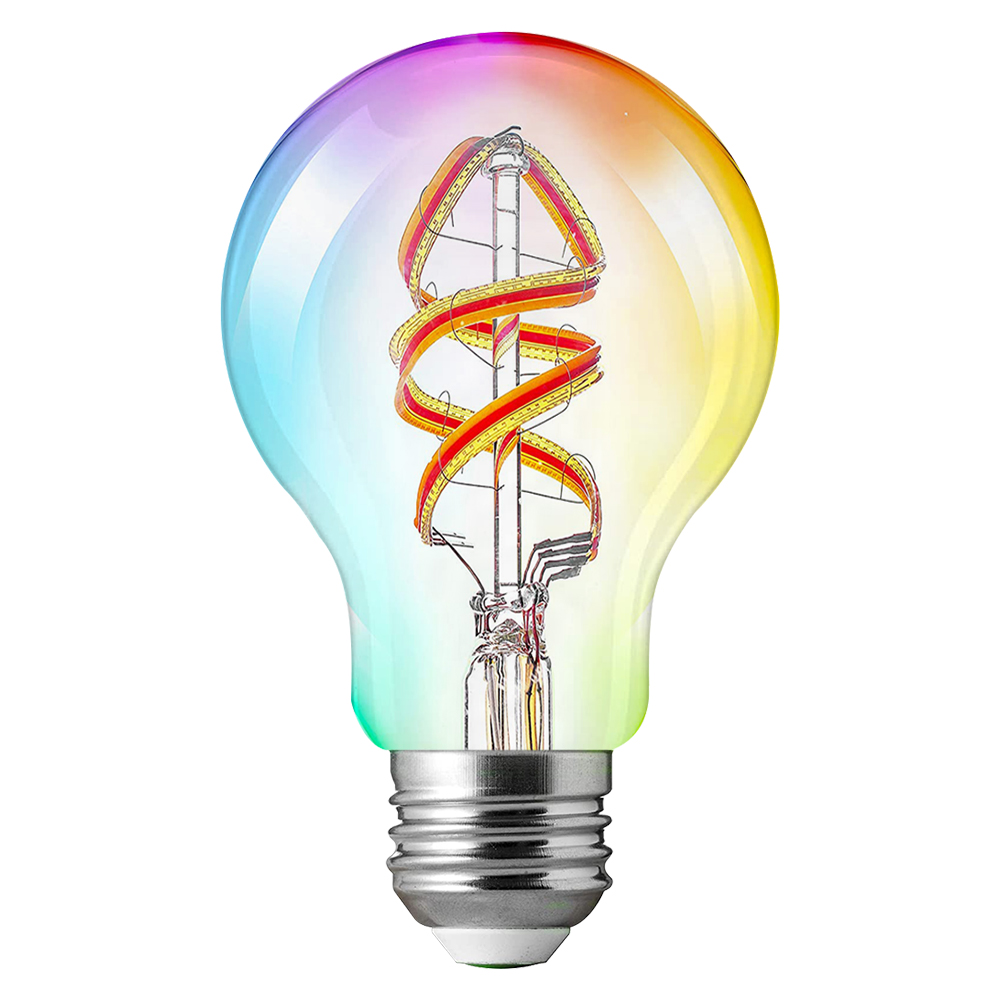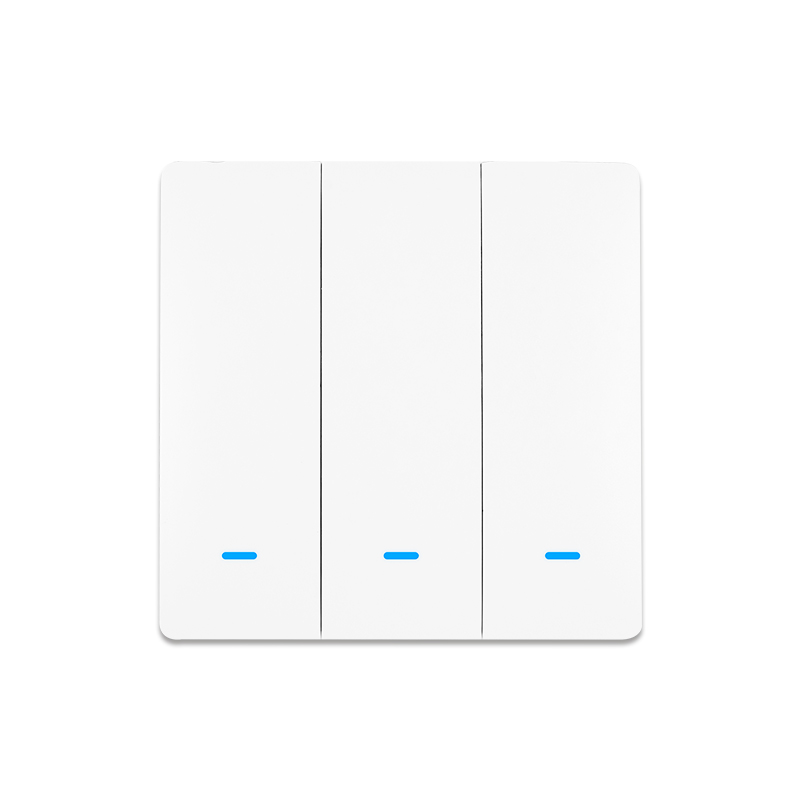In the rapidly development of smart home technology, smart lighting solutions gradually regarded as a popular choice for those seeking to enhance both convenience and energy efficiency. As the most popular new user products, smart light bulbs and smart switches have unique functions and advantages to meet different needs and preferences.
We're going to compare these two smart lighting devices. This blog will provide you with an expert breakdown of both so you can decide which is the best setup for your home's needs.
What is smart bulb?
A smart bulb is LED light bulbs equipped with built-in wireless communication capabilities. Unlike traditional bulbs, smart bulbs often have features such as remote dimming, color-changing capabilities, and the ability to be programmed or controlled via voice commands using platforms like Tuya, Amazon Alexa or Google Assistant. These bulbs provide users with flexibility and convenience in managing their lighting environment through various settings and options.
What is smart switch?
Smart switches work similarly to smart bulbs, featuring wireless communication capabilities that enable users to control the lighting remotely using a smart device. They need to be installed into a switch panel and are compatible with various types of light bulbs. Just replace the previous switch with a smart switch, and then you can enjoy the experience of smart controlling traditional bulbs. Like the features of smart bulbs, smart switches also offer features such as scheduling, voice control compatibility, and integration with home automation systems.

Pros and Cons of Smart Bulb
Easy to install and set up without necessitating additional wiring.
Can be installed into most shape light fixtures, including lamps.
Energy Efficient and Cost Efficient
Long life span compared to traditional bulbs
Higher-end options come with more features like color options, music rhythm, voice control and more.
Offers an easily customizable smart light system that suits your schedule and other preferences.
Great for people who rent but want some smart lighting.
Expensive than regular light bulbs
If the switch that the smart bulb connected to is turned off, it will not work in the case of power failure
If there are connectivity issues or smart home system failures, smart bulbs may become unresponsive.

Pros and Cons of Smart Switch
Compatible with different kinds of bulbs and lighting fixtures.
Better for smart home integration, install a smart switch to activate all bulbs in the circuit
Energy Efficient and Cost Efficient
Provides a convenient way to automate and control your devices remotely.
Adds value to the home if installed throughout the house.
More electrical expertise and somewhat technical installation process.
Connectivity issues or Wi-Fi outages can disrupt the remote control and automation features.
Incompatible with residences lacking a neutral wire (homes built before the 1980s)
Users need to be concerned about updates and potential compatibility issues they may introduce.
Applications of smart bulb and smart switch
> The best use of smart bulb
Smart bulbs allow users to customize the color and brightness of their lighting. This is ideal for creating different moods or adjusting lighting conditions for various activities. The color temperature of light can have a big effect on your mood and welfare. By setting, you can make smart bulbs simulate different lights throughout the day. Some smart light bulbs not only have classic glass design, but also provide RGB color changing and other functions that should be available, keeping traditional light feel.
Smart bulbs have the capability to sync with entertainment systems, adjusting colors or brightness in response to music, creating an immersive experience. Read our smart light bulb collection to learn more about functions of different smart bulbs.
>The best use of smart switch
When considering everyday functionality, smart wall switches emerge as more consistent and reliable solutions for smart lighting. You can manage multiple lights simultaneously, which is beneficial for large rooms or areas with multiple fixtures.
In addition, because smart switches are compatible with different kinds of bulbs and lighting fixtures, they can be installed without having to change your existing lighting fixture or any bulbs. At the same time, this means you are free to use whatever bulb with smart switches, especially if your fixture requires bulbs of a particular size, shape, or style that's incompatible with smart bulbs.,
Smart bulb vs smart switch
a. Installation and Compatibility
While smart bulbs boast a straightforward installation, smart switches entail a more intricate process, potentially necessitating professional intervention. Smart bulbs are the quickest and easiest way to incorporate connected lighting into a smart home setup, just the way you change a regular light bulb - Unscrew to remove and add the new one. The installation of smart switches necessitates the replacement of extant switches and may involve a requisite wiring process. This may involve some electrical work, and it might require compatibility with specific types of fixtures.

b. Energy Efficiency
Although many smart bulbs are designed to be energy-efficient, there have standby power consumption, even when turned off, as they need to remain in a state to receive commands. Smart switches typically replace existing traditional switches, allowing control over existing light fixtures. Since they control the entire circuit, there is no standby power consumption when the lights are turned off. In addition, if your requirement is to control multiple bulbs in a fixture or room simultaneously, a smart switch might be more energy-efficient.

c. Cost Considerations
The cost analysis involves the relative affordability of smart bulbs in contrast to the higher investment often associated with smart switches. Smart bulbs present a comparatively economical avenue for endowing select light fixtures with smart functionalities. If you want to keep your current light bulbs and have them work together, the smart switch is your new best friend. However, thinking about scenarios where multiple switches are requisite for comprehensive smart home integration, smart switches may tend to manifest a higher outlay,

d. Customization and Control
There is a distinction between the personalized control provided by smart bulbs and the centralized command inherent in smart switches. For flexibility in color and brightness control at the individual bulb level, smart bulbs are a better choice. Smart switches might be more for controlling multiple lights in a fixture or room simultaneously.
Smart bulbs exhibit versatility in their adaptability to diverse fixtures, whereas smart switches showcase flexibility in their ability to control various devices.
Which One Should You Buy?
After considering the above factors, the choice actually depends on your specific requirements including budget, compatibility and the features that you find convenient. For individuals seeking to sell or rent out their home quickly, smart bulbs could offer a valuable, temporary option. However, for a more permanent smart lighting solution, installing smart switches is more potential to increase the home's compatibility and future upgrade.
In the future, traditional single-color light bulbs might be gradually replaced by color-changing smart bulbs. For that reason, don't choose smart switches that don't work with smart bulbs. However, there is also common lighting solution for integrating smart light bulbs with smart switches. Smart bulbs are more flexible, customized, while smart switches enhance the overall lighting experience for your family. Before implementing any integration, thoroughly read product documentation, user manuals, and compatibility information provided by the manufacturers.
Whichever smart light device you choose, you should consult with our smart home experts to guide you through all the different options available on the market, as well as cover safety instructions regarding the installation process.
Contact us now for your consultation on smart home lighting system upgrade.
Post time: Jan-19-2024







